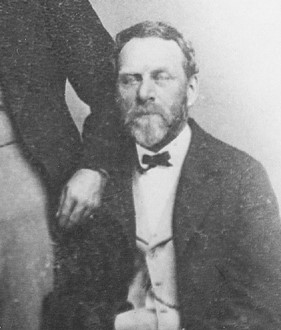Biographical Details
Date of Birth: January 19, 1816
Birth Location: Boone County, KY, USA
Graduation Year(s): 1835
Degree(s) Earned: Bachelors
Date of Death: June 11, 1876
Death Location: Bloomington, IN, USA

Date of Birth: January 19, 1816
Birth Location: Boone County, KY, USA
Graduation Year(s): 1835
Degree(s) Earned: Bachelors
Date of Death: June 11, 1876
Death Location: Bloomington, IN, USA
John Sebrie Watts was born in Kentucky, the youngest of eleven children. His father was a minister and judge, who had fought in several Indian battles. When Watts was less than a year old, his family moved to Indiana, where his father became a state senator and then a pastor. Raised in Indiana, his father died when Watts was eighteen. Watts graduated from Indiana College (now IU) in 1835, a year after his father died. From 1846 to 1847, he served in the Indiana House of Representatives. In 1851, he was appointed associate justice of the New Mexico Territory and served until 1854. This was the same year his mother died.
In 1860, Watts was elected as New Mexico Territory’s delegate to Congress. Although he was an Anglo, his career was based in the Hispanic community. In some instances, Watts accepted land in lieu of payment. In letters to President Lincoln, Watts urged him to choose New Mexicans for the territory’s appointed positions. He argued, on the floor of the U.S. House, “Whatever may be their color, [we] have invested them with all the privileges and immunities of American citizens....” Hispanic New Mexico produced a greater percentage of volunteers for the Union Army than any other state or territory. On February 24, 1863, Congress created the Territory of Arizona, stipulating the boundaries advocated by Watts on behalf of his Hispanic constituents.
During the war, Watts rendered valuable service to the Union by conveying important messages from Santa Fe to Washington, DC, often at great personal expense and risk. In 1868, President Andrew Johnson appointed Watts as chief justice of New Mexico Territory’s Supreme Court. Afterward, Watts practiced law in Santa Fe. Returning to Indiana for the last few months of his life, Watts died in Bloomington in 1876.
Watts married Elizabeth Howe in 1837. They had three children born from 1838 to 1842: Joshua, John Jr., and Fannie. Their eldest son, Joshua, graduated from IU in 1857 and returned to New Mexico after. Joshua fought in the Civil War, was promoted to lieutenant colonel by President Lincoln, and was once entrusted with over one million dollars to carry from Washington, DC, to California over land for payment of war expenses (it arrived safely). He became adjutant general of New Mexico and eventually vice and deputy-consul of the Republic of Honduras. Joshua lived to 1921.
Watts’ middle son, John Jr., attended IU, graduated in 1861, and then returned to New Mexico to become a lawyer and banker. He kept a journal about his life before the Civil War in Santa Fe, New Mexico, which was published one hundred and forty years later by Texas Tech University. John Jr. moved to Kansas and lived to 1925.
Watts’ only daughter, Fannie, married Albert Bancroft in 1866. Fannie and her husband settled in California and lived until 1922 and 1914, respectively. Watts’ wife, Elizabeth, lived out her remaining years in Berkeley, California.
In 1824, Watts’ elder brother, Johnson, and his wife had a daughter named Indiana Watts; she outlived them both and raised several children.
In 1878, Watts’ namesake grandson (John Jr.’s son) came from New Mexico to attend his grandfather’s and father’s alma mater, making it three generations who had graduated from IU.